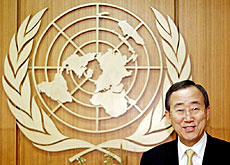
New UN chief “not going to have easy task”

How well the new United Nations Secretary-General designate, Ban Ki-moon, will do depends on the goodwill of the larger UN members, an expert tells swissinfo.
Victor-Yves Ghebali, a professor at the Graduate Institute of International Studies in Geneva, said the South Korean, who was appointed on Friday, would have to deal with the twin challenges of globalisation and the United States.
The UN General Assembly confirmed the Security Council’s choice made earlier this week. Ban Ki-moon will take over from current Secretary General Kofi Annan – who has served two five-year terms – on January 1 next year.
The South Korean Foreign Minister is a career diplomat and was the favourite for the job.
On Saturday the Swiss government congratulated Ban Ki-moon on his election, saying it hoped he would push ahead with reform of the world body and strengthen Geneva as a host city of major UN organisations.
Switzerland also expressed its deep appreciation of Annan’s work over the past decade, saying the country owed him a “big debt of thanks”.
swissinfo: Why has Ban Ki-moon been appointed?
Victor-Yves Ghebali: First, he’s Asian. It was the turn of Asia to fill the job. The second is because he is South Korean. A number of people think he will be able to manage the North Korean [nuclear] crisis. This is a miscalculation. I don’t believe that he will be able to do it because the North Korean regime is a paranoid regime that really dislikes South Korea as much as it dislikes the United States.
swissinfo: What are the main challenges Ban Ki-moon faces in his new job?
V-Y.G: There are two challenges: the first one is globalisation, which affects all inter-governmental organisations.
Most inter-governmental organisations embody multilateralism, which is meant to regulate relations between nation states and, hence, preserve national sovereignty. By contrast, globalisation holds back nation states from being fully sovereign in a world where there is no global governance yet.
Kofi Annan recognised this as early as 2000 when he said, “while the post-war multilateral system made it possible for globalisation to emerge, globalisation in turn has progressively rendered its design antiquated”. So the UN has to achieve a quantum leap from multilateralism to globalisation.
The second challenge is the US. The oxymoron is that the international order can be threatened by the undemocratic behaviour of well-established democracies as witnessed by the unlawful invasion of Iraq and the [alleged] egregious abuses of human rights.
swissinfo: And is Ban Ki-moon up to these challenges?
V-Y.G: I think this is the most difficult and challenging job in the world. I don’t think he will be able to manage both challenges, but it depends once again of the goodwill of the permanent five members of the UN Security Council [China, France, Russia, US, Britain]. The Bush administration will still be in place until January 2008 so I’m not quite sure he’s going to have an easy task.
swissinfo: Is he heavyweight enough for the job?
V-Y.G: I think that doesn’t matter because what the UN needs is not a charismatic leader and personality but an obedient servant of the powers. Otherwise you cannot survive in such a job.
swissinfo: What about reforms inside the UN – is that something that he will have to address?
V-Y.G: Of course the UN needs internal reforms, but the real problem is not internal reforms but the behaviour of the big powers. You can compare the UN to a car and when you are not happy about your car you can say it is the engine or the gasoline. But actually the real problem is the driver or drivers. So you can adopt all possible reforms at internal level but as long as the big powers do not change their behaviour the problems will remain the same.
swissinfo: It sounds like the challenges are bigger than the UN itself.
V-Y.G: Absolutely and the problem of internal reform is often taken as an alibi by the big powers just to complain about the UN. But the UN is nothing else than the sum total of the political will of its major member states.
swissinfo-interview: Isobel Leybold-Johnson
Victor-Yves Ghebali is a professor at the Graduate Institute of International Studies in Geneva and an expert on the United Nations and other international organisations.
His research interests include the League of Nations and the United Nations, East-West relations, the Organization for Security and Cooperation in Europe, the Mediterranean, as well as national minorities.
Ban Ki-moon, 62-years-old, was appointed South Korean Foreign Minister in 2004. He is a career diplomat.
He is the first UN secretary-general from an Asian country since U Thant of Burma who held the post from 1961-1971.
Ban Ki-moon succeeds Kofi Annan, a Ghanaian, who has held the post for ten years. The South Korean has promised to make the UN more effective, efficient and relevant.
Observers say Ban Ki-moon will inherit a UN in need of internal reform and tainted by the oil-for-food scandal in Iraq. The organisation is also split on how to deal with the situations in North Korea, Iran and Darfur.

In compliance with the JTI standards
More: SWI swissinfo.ch certified by the Journalism Trust Initiative



























You can find an overview of ongoing debates with our journalists here . Please join us!
If you want to start a conversation about a topic raised in this article or want to report factual errors, email us at english@swissinfo.ch.